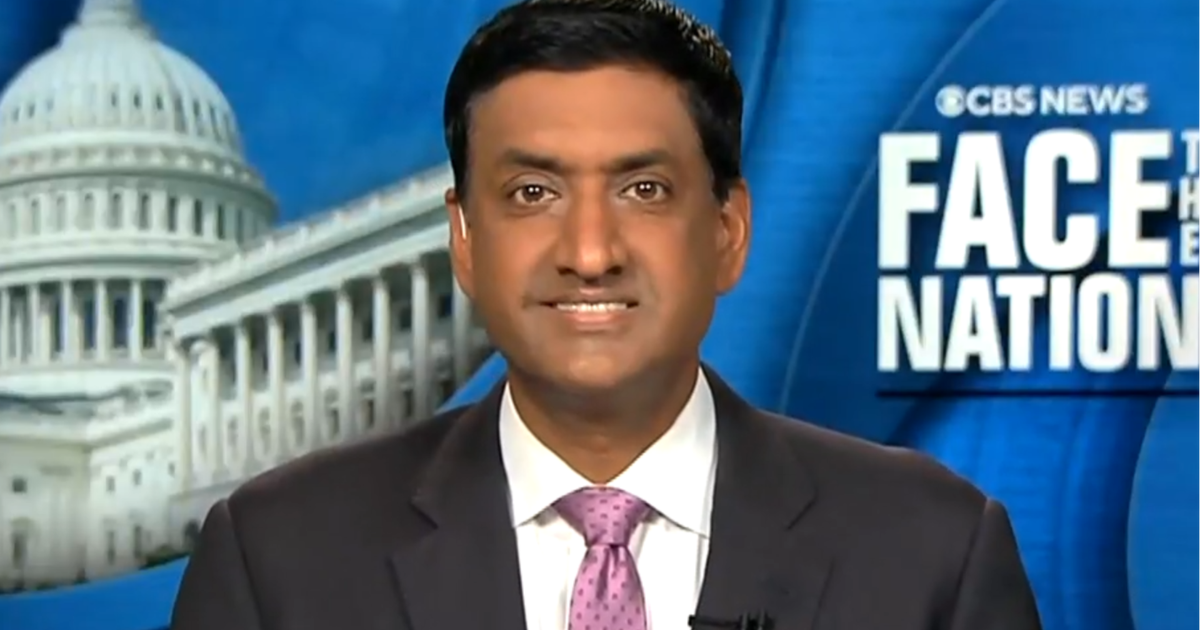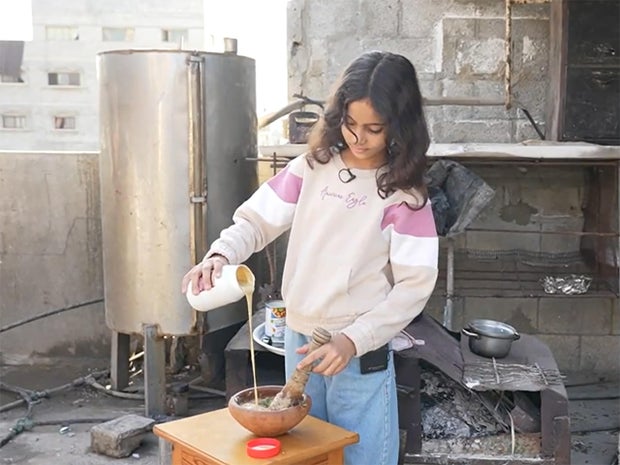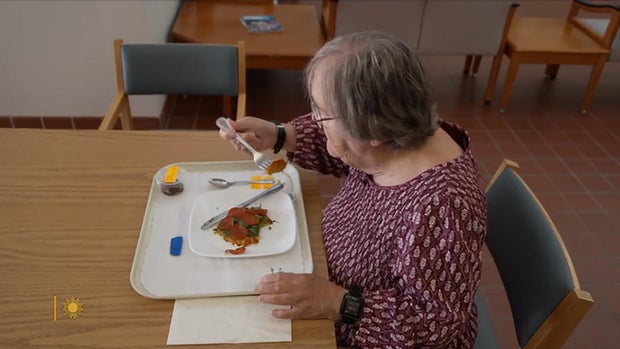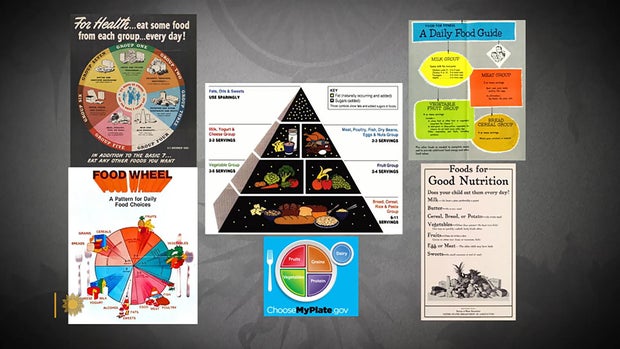CBS News
Democratic Rep. Ro Khanna says party needs “to be emphasizing the economic issues”

Rep. Ro Khanna said Democrats “need to be emphasizing the economic issues” in the wake of the 2024 election, which delivered bruising blows to the party — and prompted a reckoning on the path forward.
“We did not have a compelling enough economic vision,” Khanna, a California Democrat, said Sunday on “Face the Nation with Margaret Brennan.”
President-elect Donald Trump won a decisive victory over Vice President Kamala Harris last week, as the Democrats lost support from key demographic groups from the 2020 election. Khanna, a member of the party’s progressive wing, attributed the fracturing among the Democratic coalition to the shortcomings in the party’s economic message.
“The Democratic Party should have one simple mission, and that is to address the economic hardships and struggles of many Americans,” Khanna said. “Not just working-class Americans — a large slice of Americans who feel the American Dream has slipped away for their families and their kids.”
Khanna said new voices in Congress, like Reps. Pat Ryan, Marie Gluesenkamp Perez and Chris Deluzio, have encouraged that Democrats need to tell a “better economic story,” emphasizing a vision of raising the minimum wage, addressing child care and building new factories.
“I think that can unify our party — moderates and progressives — and it transcends race and will help us with Latino voters, Black voters, White working class voters,” Khanna said. “And we have a better vision than Donald Trump on that.”
In the days since the election, some Democrats have expressed that the economic message should have been front and center in the campaign, while arguing that the party had a focus on identity politics. But Khanna said that while he’s been clear on the importance of economic issues, “I don’t think we should run away” from issues like standing up for transgender rights and equal rights.
Khanna urged Democrats not to “shy away from your convictions,” adding that with the issues, along with a focus on the economy, the party can still be successful.
“I think we can win over people, even if they may not agree with us on a particular social issue,” Khanna said.
In Michigan, Harris lost key support in Arab American areas amid Israel’s war in Gaza. Khanna said he believes that Harris would have won Michigan “if there was more of a reckoning with the failures of policy on Gaza.” He added that he has seen that even “beyond Michigan, this really was a concern for a lot of young people and a lot of progressives.”
Amid the hand wringing over the election, Democrats have also pointed to President Biden’s late decision to leave the race and endorse Harris, including former House Speaker Nancy Pelosi. Khanna said while he has a “lot of respect for Speaker Pelosi,” he’s “chuckled” at the idea.
“The day he got out, we had Democrats with the most over-the-top superlatives, comparing him to George Washington, saying he did the most honorable thing,” Khanna said. “So now to go back and criticize him seems a bit contradictory.”
Khanna said Harris’ was a “winnable campaign,” adding that “anyone who is saying now ‘this was not a winnable campaign’ didn’t say that back in August.”
“The reason we didn’t win, ultimately, is we didn’t listen enough to people on the ground” on emphasizing economic issues, Khanna said. “The reason I’m hopeful for the future is we have the substance.”
CBS News
In praise of Seattle-style teriyaki

Watch CBS News
Be the first to know
Get browser notifications for breaking news, live events, and exclusive reporting.
CBS News
Gazan chefs cook up hope and humanity for online audience

Renad Atallah is an unlikely internet sensation: a 10-year-old chef, with a repertoire of simple recipes, cooking in war-torn Gaza. She has nearly a million followers on Instagram, who’ve witnessed her delight as she unpacks parcels of food aid.
CBS News
We interviewed Renad via satellite, though we were just 50 miles away, in Tel Aviv. [Israel doesn’t allow outside journalists into Gaza, except on brief trips with the country’s military.]
“There are a lot of dishes I’d like to cook, but the ingredients aren’t available in the market,” Renad told us. “Milk used to be easy to buy, but now it’s become very expensive.”
I asked, “How does it feel when so many people like your internet videos?”
“All the comments were positive,” she said. “When I’m feeling tired or sad and I want something to cheer me up, I read the comments.”
We sent a local camera crew to Renad’s home as she made Ful, a traditional Middle Eastern bean stew. Her older sister Noorhan says they never expected the videos to go viral. “Amazing food,” Noorhan said, who added that her sibling made her “very surprised!”
After more than a year of war, the Gaza Strip lies in ruins. Nearly everyone has been displaced from their homes. The United Nations says close to two million people are experiencing critical levels of hunger.
Hamada Shaqoura is another chef showing the outside world how Gazans are getting by, relying on food from aid packages, and cooking with a single gas burner in a tent.
Shaqoura also volunteers with the charity Watermelon Relief, which makes sweet treats for Gaza’s children.
In his videos online, Shaqoura always appears very serious. Asked why, he replied, “The situation does not call for smiling. What you see on screen will never show you how hard life is here.”
Before dawn one recent morning in Israel, we watched the UN’s World Food Program load nearly two dozen trucks with flour, headed across the border. The problem is not a lack of food; the problem is getting the food into the Gaza Strip, and into the hands of those who desperately need it.
The UN has repeatedly accused Israel of obstructing aid deliveries to Gaza. Israel’s government denies that, and claims that Hamas is hijacking aid.
“For all the actors that are on the ground, let the humanitarians do their work,” said Antoine Renard, the World Food Program’s director in the Palestinian territories.
I asked, “Some people might see these two chefs and think, well, they’re cooking, they have food.”
“They have food, but they don’t have the right food; they’re trying to accommodate with anything that they can find,” Renard said.
Even in our darkest hour, food can bring comfort. But for many in Gaza, there’s only the anxiety of not knowing where they’ll find their next meal.
For more info:
Story produced by Mikaela Bufano. Editor: Carol Ross.
See also:
“Sunday Morning” 2024 “Food Issue” recipe index
Delicious menu suggestions from top chefs, cookbook authors, food writers, restaurateurs, and the editors of Food & Wine magazine.
CBS News
A study to devise nutritional guidance just for you

It’s been said the best meals come from the heart, not from a recipe book. But at this USDA kitchen, there’s no pinch of this, dash of that, no dollops or smidgens of anything. Here, nutritionists in white coats painstakingly measure every single ingredient, down to the tenth of a gram.
Sheryn Stover is expected to eat every crumb of her pizza; any tiny morsels she does miss go back to the kitchen, where they’re scrutinized like evidence of some dietary crime.
Stover (or participant #8180, as she’s known) is one of some 10,000 volunteers enrolled in a $170 million nutrition study run by the National Institutes of Health. “At 78, not many people get to do studies that are going to affect a great amount of people, and I thought this was a great opportunity to do that,” she said.
CBS News
It’s called the Nutrition for Precision Health Study. “When I tell people about the study, the reaction usually is, ‘Oh, that’s so cool, can I do it?'” said coordinator Holly Nicastro.
She explained just what “precise” precisely means: “Precision nutrition means tailoring nutrition or dietary guidance to the individual.”
The government has long offered guidelines to help us eat better. In the 1940s we had the “Basic 7.” In the ’50s, the “Basic 4.” We’ve had the “Food Wheel,” the “Food Pyramid,” and currently, “My Plate.”
CBS News
They’re all well-intentioned, except they’re all based on averages – what works best for most people, most of the time. But according to Nicastro, there is no one best way to eat. “We know from virtually every nutrition study ever conducted, we have inner individual variability,” she said. “That means we have some people that are going to respond, and some people that aren’t. There’s no one-size-fits-all.”
The study’s participants, like Stover, are all being drawn from another NIH study program called All Of Us, a massive undertaking to create a database of at least a million people who are volunteering everything from their electronic health records to their DNA. It was from that All of Us research that Stover discovered she has the gene that makes some foods taste bitter, which could explain why she ate more of one kind of food than another.
Professor Sai Das, who oversees the study at Tufts University, says the goal of precision nutrition is to drill down even deeper into those individual differences. “We’re moving away from just saying everybody go do this, to being able to say, ‘Okay, if you have X, Y and Z characteristics, then you’re more likely to respond to a diet, and somebody else that has A, B and C characteristics will be responding to the diet differently,'” Das said.
It’s a big commitment for Stover, who is one of 150 people being paid to live at a handful of test sites around the country for six weeks – two weeks at a time. It’s so precise she can’t even go for a walk without a dietary chaperone. “Well, you could stop and buy candy … God forbid, you can’t do that!” she laughed.
While she’s here, everything from her resting metabolic rate, her body fat percentage, her bone mineral content, even the microbes in her gut (digested by a machine that essentially is a smart toilet paper reading device) are being analyzed for how hers may differ from someone else’s.
Nicastro said, “We really think that what’s going on in your poop is going to tell us a lot of information about your health and how you respond to food.”
CBS News
Stover says she doesn’t mind, except for the odd sounds the machine makes. While she is a live-in participant, thousands of others are participating from their homes, where electronic wearables track all kinds of health data, including special glasses that record everything they eat, activated when someone starts chewing. Artificial intelligence can then be used to determine not only which foods the person is eating, but how many calories are consumed.
This study is expected to be wrapped up by 2027, and because of it, we may indeed know not only to eat more fruits and vegetables, but what combination of foods is really best for us. The question that even Holly Nicastro can’t answer is, will we listen? “You can lead a horse to water; you can’t make them drink,” she said. “We can tailor the interventions all day. But one hypothesis I have is that if the guidance is tailored to the individual, it’s going to make that individual more likely to follow it, because this is for me, this was designed for me.”
For more info:
Story produced by Mark Hudspeth. Editor: Ed Givnish.
“Sunday Morning” 2024 “Food Issue” recipe index
Delicious menu suggestions from top chefs, cookbook authors, food writers, restaurateurs, and the editors of Food & Wine magazine.







